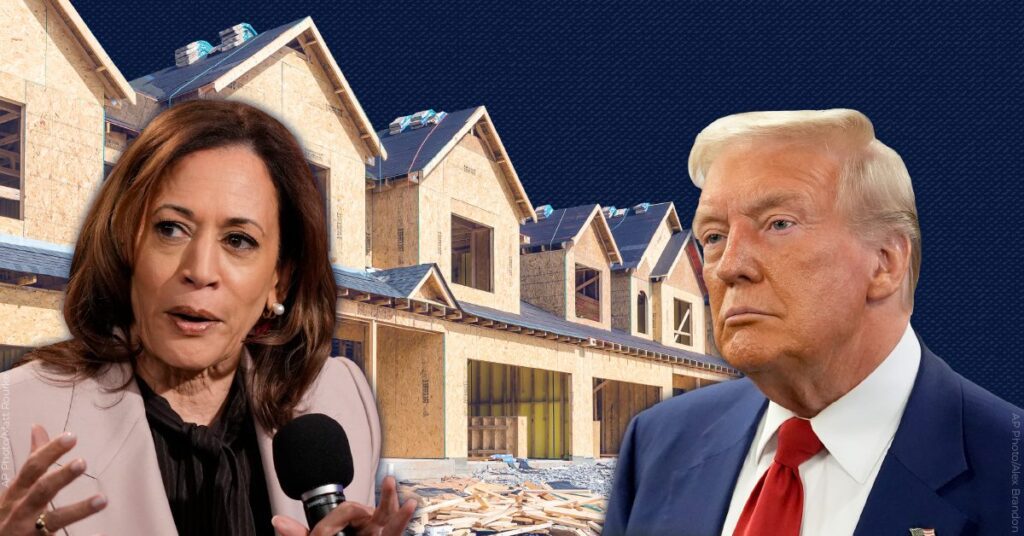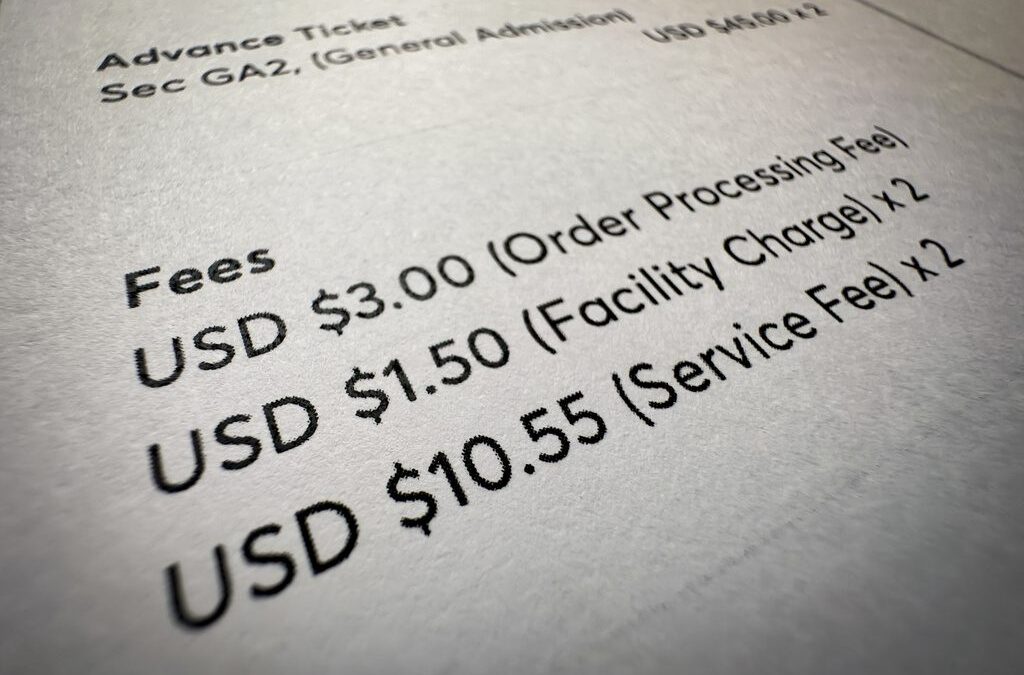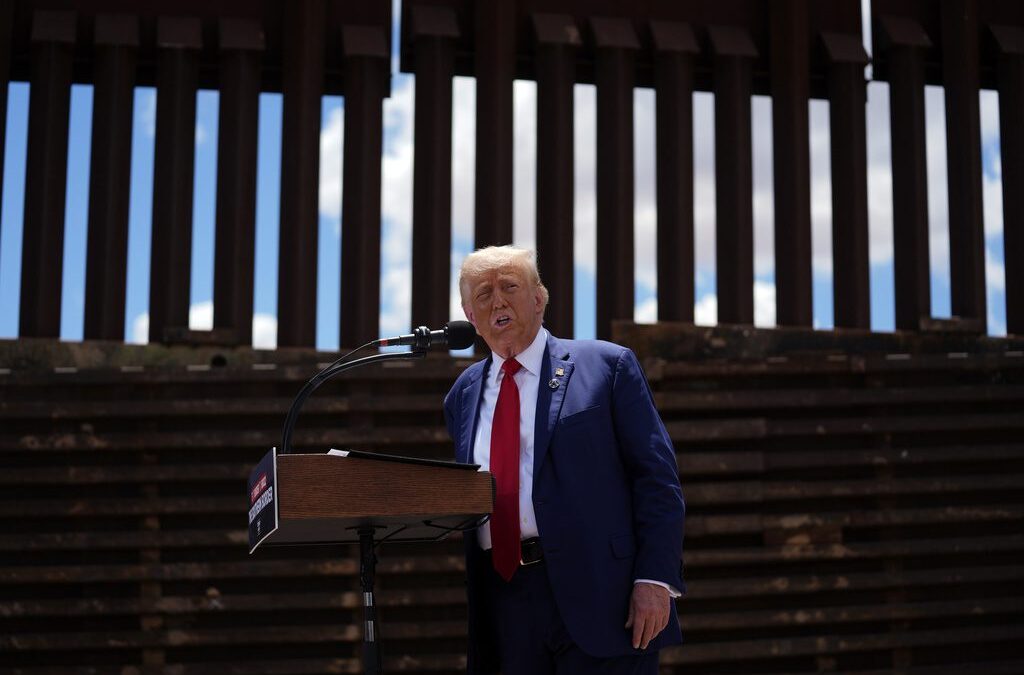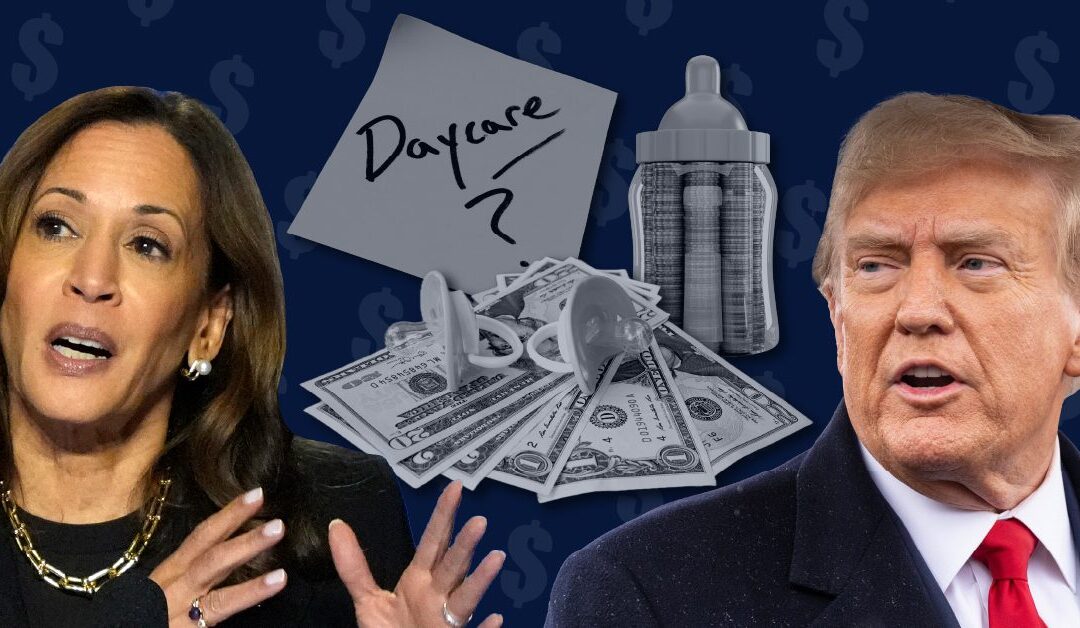
Harris has vowed to increase the available housing supply by three million homes and to provide lower-income first-time homebuyers with up to $25,000 in down payment support. Trump, on the other hand, has offered no specific plans for addressing the housing crisis. (Graphic by Francesca Daly)
Harris has vowed to increase the available housing supply by three million homes and to provide lower-income first-time homebuyers with up to $25,000 in down payment support. Trump, on the other hand, has offered no specific plans for addressing the housing crisis.
It’s no secret that Nevada is in the midst of a housing crisis.
In Sept. 2020, the median home sale price in Nevada was $344,900. As of July 2024, that figure had risen to $467,400, a 35% increase, according to Redfin. In Las Vegas, the average cost of rent is $1,457 per month, up over 30% from the beginning of the pandemic.
The lack of affordable homes and rentals is straining middle- and working-class families in Nevada and has become a key issue in this year’s presidential election.
But only one candidate has thus far proposed any specific plans to deal with housing costs.
Kamala Harris’ housing plan focuses on boosting supply and lowering costs
Democratic nominee for president Kamala Harris frequently speaks of housing costs while on the campaign trail, highlighting her own mom’s journey to home ownership and why action is needed to support families as they pursue their own version of that journey.
“My mother saved for years to buy a home,” Harris says in one of her campaign ads. “I was a teenager when that day finally came—I remember how excited she was. Right now, home ownership is out of reach for too many Americans. When I am president, we will end the housing shortage by building three million homes and rentals.”
Harris recently released a plan to address both the country’s housing supply shortage and to make it easier for middle-class and working-class families to buy homes.
Harris has promised to increase the available housing supply in the US by expanding the Low-Income Housing Tax Credit, which provides incentives for both state and local investment in housing.
Harris also wants to create a $40 billion tax credit that would make building new housing more economically practical for builders. The goal is to encourage rapid building of affordable housing in order to close the gap between housing needed and housing currently available as well as support “innovative” methods of construction financing. This funding would also make certain federal lands eligible to be repurposed for new housing developments.
To cut down on red tape and to bring down housing costs, Harris’ plan also calls for streamlining the permit approval and review process.
“In some places, it is too difficult to build, and it is driving prices up,” Harris said during a recent campaign event in North Carolina.
Collectively, these policy proposals seek to create three million homes by 2028, as Harris said in her ad.
If elected, Harris has also vowed to create a plan to provide lower-income first-time homebuyers with up to $25,000 in down payment support.
Harris is also supporting two existing bills to address the rising cost of rent and lower tenants’ costs. She has endorsed the Stop Predatory Investing Act, which would remove key tax benefits for housing investors who acquire a large number of single-family rental homes. The Preventing the Algorithmic Facilitation of Rental Housing Cartels Act, on the other hand, seeks to crack down on rent-setting software that “enables price-fixing among corporate landlords.”
Harris has also backed a proposal from President Biden, who in July called on Congress to pass a law that would withdraw tax credits from landlords who raise rent by more than 5% annually. If passed, the plan would apply to landlords with at least 50 units in their portfolio, meaning that overall, 20 million units nationwide would be affected, according to the White House.
That’s about half of all rentals in the United States.
Trump’s plan on housing is less clear
On the other side of the aisle, Donald Trump primarily blames immigrants for housing shortages and suggests deporting them will help lower demand for housing and solve the issue, even as policy experts largely agree that the core root of the housing crisis is a supply problem.
Trump’s plan to deport undocumented immigrants could actually worsen the supply issue too, as roughly 20% of the workforce in construction in the US is undocumented. If all those workers are deported, fewer homes and apartments will get built, exacerbating the housing crisis.
Trump has also suggested opening certain tracts of federal land for housing development, addressing supply chain shortages, and removing certain regulations on homebuilding — though he hasn’t yet detailed how he plans to accomplish any of that.
His 2017 tax law, however, could offer one clue: the law lowered the corporate tax rate and included a provision that created “opportunity zones” to encourage investment in low-income areas. Opportunity zones are “economically distressed communities” where “private investments may be eligible for capital gain tax incentives,” according to the US Economic Development Administration.
In other words, real estate development companies stand to benefit from investing in these communities, with questionable benefits for community members and would-be homebuyers.
In fact, a 2022 Center for American Progress (CAP) analysis of research by economists Patrick Kennedy and Harrison Wheeler finds that these zones “are costly and poorly targeted and do little to create jobs or improve conditions in poor communities.”
The analysis finds that opportunity zones “provide massive tax benefits to wealthy investors while subsidizing investment in few communities with relatively higher incomes, home values, and educational attainment as well as stronger income and population growth.”
“Opportunity zones’ singular focus on reducing taxes owed on capital gains structurally favors projects that generate high returns, rather than the greatest social impact,” the analysis says.
Project 2025 is the only other place to look for possible insight into Trump’s policies on housing. Although the former president has vehemently denied his involvement with the far-right plan, his name is mentioned 312 times in the document, and more than 140 former Trump administration officials contributed to it.
Chapter 15 of the 900-page far-right plan for a second Trump term focuses on the Department of Housing and Urban Development (HUD). One of the first few lines reads: “the Secretary should initiate a HUD task force consisting of politically appointed personnel to identify and reverse all actions taken by the Biden Administration to advance progressive ideology.”
That “progressive ideology” refers to Property Appraisal and Valuation Equity (PAVE) policies and the Affirmatively Furthering Fair Housing (AFFH) regulation. These policies and regulations were implemented by the Biden administration in an effort to “chip away at the decades of housing inequality still affecting communities today by preventing racial bias in home appraisal.”
Project 2025 also calls for prohibiting “noncitizens, including all mixed-status families, from living in all federally assisted housing,” on page 509, which means that tens of thousands of immigrant families would face eviction. Tens of thousands of immigrant children would also be evicted from their homes under that proposal, according to HUD.
Project 2025 also wants to scrap “housing first” models of assistance, which have been proven to be “far more effective at reducing poverty and homelessness” than “treatment first” models, which frequently require mental health treatment and sobriety.
The document also recommends that Congress allow land that’s currently being used for public housing to be sold to private developers.

Sick of hidden fees on concert tickets and hotel stays? A new federal rule bans them.
Now, live event businesses and hotels must clearly list their prices in both their advertising and pricing information. American consumers on...

Trump’s tariff plan would raise prices and ‘reduce the living standard of Americans,’ economists say
Trump’s plan would effectively be a sales tax that disproportionately harms working-class families and could cause a trade war that hurts US...

Trump’s tariff and tax plan would raise taxes on 95% of Americans, report finds
In response to the report, the Harris-Walz campaign released an analysis of its own, outlining how Trump’s agenda would raise costs for over 1.2...

Trump’s economic plans would worsen inflation, experts say
Mainstream economists warn that Trump's plans to impose huge tariffs on imported goods, deport millions of migrant workers, and demand a voice in...

Harris wants to give working families a tax cut and raise taxes on corporations. Trump would do the opposite.
Kamala Harris has proposed increasing the corporate tax rate, expanding the child tax credit, and cutting taxes for more than 100 million working...

Harris wants to cap child care costs and expand the child tax credit. Trump’s solution? Tariffs.
Harris has proposed capping families’ child care costs to 7% of their income and offering families of newborns up to $6,000 in the first year of the...



